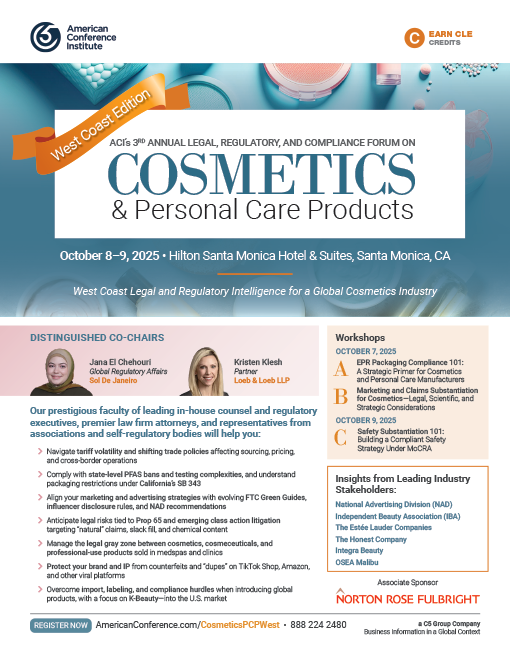Agenda

Flip through our conference brochure and discover what’s new this year.
Download Brochure
Pre-Conference Workshops
October 7, 2025
Day 1
October 8, 2025
Federal Outlook, Policy Shifts and Trade
Navigating Political Shifts, Trade Volatility, and Regulatory Uncertainty in the New Age of Tariffs: What Lies Ahead for the Cosmetics Industry?

Ryan MajerusPartnerKing & Spalding LLP
As political leadership and global dynamics shift, cosmetics manufacturers must stay alert to the ripple effects on trade policy, regulatory enforcement, and international operations. Our panelists will examine the evolving landscape tariffs, and their impact on the cosmetics industry.
- Understanding what trade policy shifts and tariff fluctuations could mean for your bottom line
- Best practices for cosmetics companies for managing global operations across jurisdictions to avoid tariffs
- How to maintain compliance across HQs, subsidiaries, and third-party entities
- Reviewing tariffs volatility and the impact on sourcing, pricing, and manufacturing strategy
- Assessing how multinational companies are keeping control across borders
- How cosmetics companies- large and small- can navigate ongoing uncertainty and adjust their risk appetite?
- Assessing what legal and regulatory teams should be doing right now to stay agile in a shifting environment
As the cosmetics industry continues to adapt to MoCRA’s sweeping regulatory changes, we are now faced with a patchwork of pending rulemaking, shifting timelines, and uncertainty around FDA enforcement under the new administration.
- Status check on MoCRA rulemaking: GMPs, fragrance allergen labeling, and product listing renewals
- Assessing legal risks, documentation best practices, and compliance workflows
- A look at FDA’s current posture on inspections and enforcement—what we know, and what remains unclear
- Preparing for litigation exposure tied to adverse events and safety substantiation gaps
- What can companies do now to stay ahead of regulatory expectations despite delays and ambiguity?
Morning Networking Coffee Break
Environmental & Sustainability Considerations
With California’s AB 2771 banning PFAS in cosmetics taking effect January 1, 2025, and similar legislation emerging nationwide, there is an urgent need to assess compliance strategies and risk exposure. But with no uniform testing standards, evolving methodologies, and increasing litigation, PFAS compliance remains a complex and evolving concern.
- Highlighting key provisions of AB 2771 and state-by-state PFAS restrictions
- It’s all about testing!
- Reviewing testing complexities such as total organic fluorine vs. intentionally added PFAS
- How are toxicologists and testing labs making sense of the scientific and regulatory uncertainty?
- Analyzing PFAS in packaging materials- What’s being overlooked and how your business can stay ahead of evolving standards?
- Assessing the best practices for communication, documentation, and risk mitigation
Recyclability Under Scrutiny: Complying with California’s SB 343 and Getting your Packaging Strategy in Check

Trenton NorrisPartnerHogan Lovells LLP
With SB 343 taking effect for products manufactured after October 6, (year) California is significantly narrowing what can be labeled as recyclable. Cosmetics companies are now feeling the pressure to ensure sustainability claims meet new legal standards, as other states consider similar measures.
In this session, our panelists will help you navigate conflicting standards in SB 343, How2Recycle, and state-mandated resin code requirements, while balancing compliance with eCommerce- vs. retail-specific labeling needs.
- Developing practical guidance on aligning your compliance strategy with current and upcoming state and federal requirements
- Assessing the differences between SB 343 and SB 54, to best manage your packaging compliance strategy
Networking Lunch
Riding the West Coast Regulatory Wave: Best Practices for Cosmetics Companies to Manage the California and Washington State Laws

Maureen F. GorsenPartnerSidley Austin LLP
If history is any guide, a slowdown in federal action on cosmetics regulation often signals a surge in state-level activity— especially on the West Coast, where states are stepping in with aggressive laws, enforcement efforts, and heightened compliance demands.
- Reviewing the proposed new allergen disclosure requirements under The California Safe Cosmetics Act
- California AB 496 and the ban on anti-aging products for minors—what’s behind the push and what it means for brands
- Compliance with California’s SB 343 on recycling and labeling, and how it differs from SB 54 on EPR
- Understanding and responding to California Air Resources Board (CARB) surveys on Volatile organic compounds (VOCs) in sprays, dry shampoos, and aerosols
- Assessing strategic insights into how companies are managing overlapping and conflicting state laws
- What to watch out for in California’s Unfair Competition Law (UCL), False Advertising Law (FAL), and Consumer Legal Remedies Act (CLRA)
- Updates on Washington State’s heavy metal and lead restrictions and related product testing expectations

Riëtte van LaackDirectorHyman, Phelps & McNamara PC

Jennifer OrendiSenior AttorneyOrendi Legal Consulting
The line between cosmetics, cosmeceuticals, and clinical treatments continues to blur, and the legal and regulatory challenges facing both manufacturers and medspa operators are growing increasingly complex
Our panelists will examine the unique regulatory and contractual considerations that arise when professional-use cosmetics and skincare products are marketed, labeled, and sold into medspas, massage clinics, and other treatment environments.
- Examining where the FDA and FTC draw the line between cosmetics, cosmeceuticals, and drugs
- Understanding the key labeling and distribution requirements specific to professional-use cosmetics
- Analyzing enforcement trends targeting medspas and clinics for aggressive or unsupported product claims
- Obtaining practical guidance on contractual protections for manufacturers selling to medspas or through wholesale channels
- Highlighting NAD scrutiny and FTC advertising risks when claims are made by third-party service providers
- How to respond when clinics ask: “Are we regulated the same way as you?”
Afternoon Break

Brendan KoethPartnerLowenstein Sandler LLP
As indie beauty brands evolve into mid-sized players, the path to growth is packed with complex legal and regulatory hurdles. From securing private equity investment and preparing for retail partnerships to navigating tariffs, outsourcing, and state-by-state compliance, scaling is not just a business challenge, it’s a compliance one.
- Are you “Retail-Ready”? – What does it take to meet the operational and legal expectations of large retailers like Target or Sephora
- Watching out for California-specific compliance
- Reviewing employment law traps, contractor classifications, and chemical bans that uniquely impact growing brands in the state
- Key considerations for global expansion
- What are the key regulatory pitfalls when entering new markets?
- Understanding the legal risks of relying too heavily on distribution partners abroad
- Getting your vendor & manufacturing agreements in check
- Balancing cost-efficiency with risk when negotiating contracts with overseas manufacturers
- Assessing when to bring in legal support and how to build the right external legal and compliance team without the full-time in-house costs

Jennifer SantosAttorneyNational Advertising Division (NAD)

Jennifer AdamsPartnerAmin Wasserman Gurnani

Claire HughesCorporate Legal CounselIntegra Beauty

Tiffany FerrisPartnerHaynes & Boone LLP
- Assessing FTC’s pending Green Guides on recyclability and environmental claims
- Highlighting the FTC’s Endorsement Guides and underlining the importance of using clear disclosures to support transparency and meet compliance standards
- Reviewing recent enforcement trends, NAD decisions, and challenges around consumer testimonials
- Tips for avoiding greenwashing allegations
Select your table of choice to benefit from smaller-group benchmarking and discussion. Compare notes with your industry peers on the latest best practices and expand your network. Each table will be led by industry leaders.
- Tariffs & Trade Strategy – What’s Your Company Doing?
- Product Development + Legal: Working Better Together from Concept to Shelf
- Sensitive Claims, Strong Proof: Substantiating ‘Anti-Aging’ and ‘Safe for Kids’
Closing Remarks – Conference Adjourns
Day 2 & Post-Conference Workshop
October 9, 2025
Continental Networking Breakfast and Registration
Litigation Focus

Dennis RaglinPartnerSteptoe & Johnson LLP
With recent developments in titanium dioxide and diethanolamine (DEA)-related litigation, and ongoing changes to short-form warning requirements, Prop 65 enforcement remains a moving target for cosmetics companies.
- Examining product packaging & labeling considerations relative to Prop 65:
- Updates on short-form warning regulations and their practical implications
- When are warnings required?
- Analyzing real-world Prop 65 litigation examples and defense and settlement strategies TiO₂ and DEA litigation: What we’ve learned, and why new claims are still surfacing
- Anticipating what’s next in the crosshairs for high-risk chemicals likely to be targeted
- Taking a closer look at testing standards and the challenge of global lab inconsistencies
- Assessing strategies for minimizing enforcement risk, particularly when working with overseas suppliers

Arameh O’BoylePartnerMintz, Levin, Cohn, Ferris, Glovsky and Popeo, P.C.

Collie F. JamesIV, PartnerMorgan Lewis & Bockius LLP

Jeff MarguliesPartner-in-ChargeNorton Rose Fulbright
Businesses continue to be faced with consumer class actions and regulatory scrutiny, facing a wave of litigation ranging from “natural” claims and slack fill disputes to the continuing rise in PFAS and other contaminants lawsuits.
- Reviewing The Ninth Circuit’s decision in Davidson v. Kimberly-Clark Corp. and its implications on consumer protection claims under California law
- Assessing the latest in false advertising class actions and claims involving “all natural,” “no artificial coloring,” expiration dates, and other labeling gray zones
- Key learnings and best practices to mitigate risk for slack fill and packaging litigation
- Analyzing the litigation landscape around PFAS, Benzene, and other contaminants
- Relying on proactive defense tactics and how regulatory and legal teams can collaborate to anticipate and defend against emerging suits
Morning Networking Break
AI and Intellectal Property Considerations
Beauty & the Bot: Navigating the Legal, Regulatory, and Contractual Realities of AI for Cosmetics Companies
It’s not new that the beauty industry has embraced AI— from content generation and influencer campaigns to product development and customer engagement—the legal and regulatory landscape is quickly evolving. Let’s take a look at the complex web of AI-related risks and regulatory requirements. Building a company-wide framework for responsible AI use, through internal policies and training.
- Brand responsibility vs. platform liability: Who is accountable when AI goes wrong?
- Checking your Influencer, affiliate, and UGC (user-generated content) agreements for must-have AI clauses and disclosure terms
- Reviewing transparency best practices and disclosing AI use in
- Edited images, videos, and product claims
- AI-generated marketing content
- Exploring key considerations for contract-drafting in the age of AI
- Navigating The California Consumer Privacy Act (CCPA), GDPR, and cross-border compliance in AI workflows
Protecting Your Brand in the Age of Dupes, Counterfeits, and Viral Platforms: Advanced IP Strategies for the Cosmetics Industry

Kiri Lee SharonPartnerFoley & Lardner LLP
As TikTok Shop, Amazon, and other emerging e-commerce platforms continue to transform how beauty products are discovered and sold, cosmetics companies are facing a surge in counterfeit listings, misleading “dupes,” and IP enforcement challenges across jurisdictions.
- Reviewing effective enforcement tactics on TikTok Shop, Amazon, and other e-commerce sites
- How to assess whether a “dupe” crosses the line into infringement—lessons from the e.l.f. vs. Benefit case
- Assessing best practices to safeguard trademarks, designs, product names, and brand identity
- Teaching internal teams how to vet product names before filing trademarks and coordinate design/patent filings
- Taking strategic approaches to protecting descriptive names, color/shade identifiers, and product bundles
- Tips for navigating the USPTO databases and the Madrid and Hague Systems for global protection
- Legal considerations surrounding companies choosing their own “vegan,” “not tested on animals,” and other visual certification symbols
As Korean beauty (K-Beauty) continues its global ascent, more brands are expanding into the U.S. market—via direct-to-consumer platforms, flagship store launches, and major retail partnerships. But with increased visibility comes heightened scrutiny, and navigating the complex regulatory landscape is critical for long-term success.
This session will unpack the key legal and compliance challenges companies face when introducing K-Beauty products into the U.S. and explore practical strategies to stay ahead of evolving requirements.
- Understanding How K-Beauty brands are navigating U.S. import rules, including sunscreen classification and OTC requirements
- Lessons learned from launching a Korean brand stateside—from marketing to retail partnerships
- What key compliance and business challenges should you anticipate when introducing K-Beauty products to the U.S. market?
- Reviewing labeling, ingredient, and formulation challenges when adapting Korean products for U.S. and global markets
- Considerations for tariffs, trade, and import logistics for Korean cosmetics entering the U.S.

